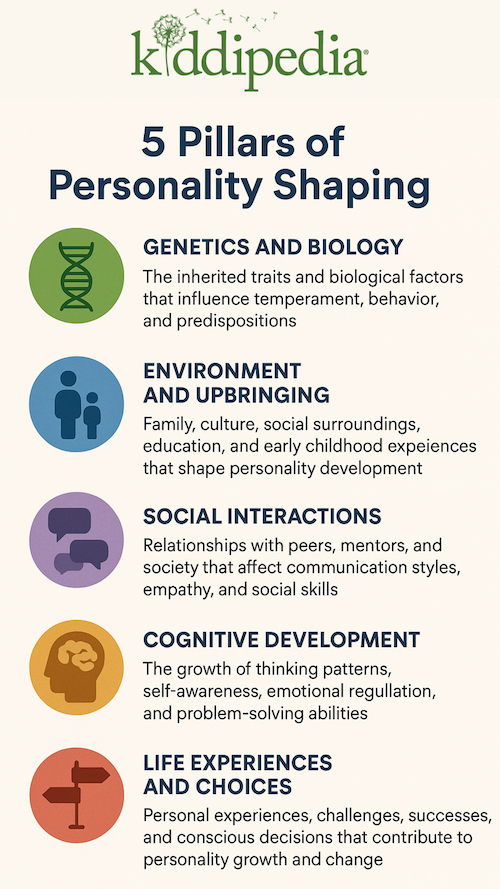Long before they write their first love letter, before high school crushes, and before any talk of “the one,” children are quietly, gradually building the blueprint for the relationships they will one day seek. It happens not in grand, cinematic moments, but in the small, everyday ones—how they are spoken to, how their emotions are handled, and how they learn to navigate the world.
This is the heart of personality shaping. And while we can’t choose our children’s future partners, we can influence the type of partner they believe they deserve—and ultimately, the kind of love they accept.
Modern developmental psychology, neuroscience, and attachment theory all point to five core pillars that shape a child’s personality. These pillars lay the foundation for emotional intelligence, resilience, and even the kinds of relationships children are drawn to in adulthood.
Introducing the 5 Pillars of Personality Shaping
The 5 Pillars of Personality Shaping is a contemporary, evidence-based framework. It brings together decades of research from developmental psychology, neuroscience, and attachment theory to help parents understand how early experiences shape who their children become.
While the term itself wasn’t coined by a single expert, this concept draws from the foundational work of renowned psychologists such as John Bowlby, Erik Erikson, Albert Bandura, Daniel Goleman, and Dr. Dan Siegel.
Each pillar—emotional safety, modelling and social learning, identity formation, autonomy, and relational intelligence—represents a core influence that shapes a child’s personality, emotional health, and their future capacity to form secure, healthy relationships.
Designed to be practical and parent-friendly, this framework translates complex science into everyday guidance that empowers families to raise resilient, emotionally intelligent individuals.

Let’s delve into these five evidence-based pillars and explore why they’re not just crucial for healthy development but also vital for fostering emotionally safe, respectful, and fulfilling future relationships.
1. Genetics and Biology: The Temperament Toolkit
From the moment a baby enters the world, their biology begins writing part of their story. Genetics and early neurological development influence traits like sensitivity, impulsivity, and how intensely a child feels and expresses emotions.
While we can’t change their DNA, we can shape the environment around their biology. For example, a highly sensitive child may grow into an adult with extraordinary empathy and self-awareness—if their emotional needs are consistently met, validated, and supported.
🧠 Why it matters later: Children who grow up feeling safe in their biological skin are more likely to become adults who seek partners who respect their sensitivities rather than exploit them.
2. Environment and Upbringing: The Emotional Climate
Every home has its own emotional weather pattern. Is it warm and supportive? Or cold and unpredictable? Children absorb this atmosphere like sponges. They internalise the tone of voices, the presence (or absence) of affection, and how conflict is resolved (or ignored).
These patterns don’t just shape how they see themselves; they shape how they expect to be treated. This is the realm of attachment theory, which shows that secure childhood environments promote healthy relationship models in adulthood.
🏡 Why it matters later: Children raised in nurturing, emotionally responsive homes are more likely to seek out secure, emotionally mature partners—and to become one themselves.
3. Social Interactions: Practice for Partnership
From playground negotiations to classroom group work, kids are constantly refining their social skills. These early interactions are rehearsals for intimacy. They teach boundaries, reciprocity, communication, and compromise.
The ability to read social cues, show empathy, and regulate emotions isn’t just about friendship—it’s about emotional attunement, a foundational skill in romantic relationships.
👫 Why it matters later: Children who learn respectful communication and conflict resolution early are better equipped to identify (and reject) toxic relationship dynamics later in life.
4. Cognitive Development: The Thinking Child
As children grow, so does their capacity to think critically about themselves and others. This includes the ability to self-reflect, understand others’ perspectives, and evaluate long-term consequences—a process closely tied to executive function.
Crucially, how children interpret their worth, their identity, and their ability to affect change in their own lives is a mental framework that shapes who they choose as partners. Do they feel worthy of love? Do they believe they can set boundaries? Do they think kindness is a strength or a weakness?
🧩 Why it matters later: Children who are empowered to think independently and compassionately develop the internal compass needed to choose partners who align with their values—not just their insecurities.
5. Life Experiences and Choices: The Power of Narrative
Not all personality is pre-written. Children’s choices—and how we respond to them—form an evolving personal narrative. A child who learns that failure is a teacher, not a sentence, becomes an adult resilient in love and loss. A child whose voice is heard grows into an adult who doesn’t shrink in the presence of someone else’s needs.
These lived experiences, and how children process them, shape their beliefs about love, respect, and compromise.
📖 Why it matters later: The stories children tell themselves—“I’m worthy,” “I can speak up,” “I deserve respect”—become the filters through which they view romantic connection.
So, What Can Parents Do?
You don’t need to be perfect. You just need to be present.
Here are a few practical ways to help shape your child’s personality—and their future relationships—on solid ground:
-
✅ Model emotional honesty: Talk about your feelings. Show healthy ways to express anger, joy, and sadness.
-
✅ Create a home where they feel seen: Validation builds self-worth, and self-worth sets the bar for love.
-
✅ Let them make age-appropriate decisions: Agency now leads to empowerment later.
-
✅ Teach them about boundaries early: Respect their “no.” Encourage their ability to set limits.
-
✅ Celebrate kindness and accountability: These are the cornerstones of both character and lasting love.
Final Thoughts
We often focus on math scores, reading levels, and sports trophies when raising children. But the true legacy we leave isn’t measured by achievement—it’s measured by how our children love and allow themselves to be loved.
By nurturing the five pillars of personality shaping, we’re not just raising good kids. We’re raising future partners, future parents, and future people who know their worth and expect kindness in return.
And in a world that too often rewards performance over presence, that may just be the most radical thing we can do.
Sources
-
🔗 Early Parental Bonds Shape Future Empathy – Neuroscience News (2024)
-
🔗 Personality Development from Early Childhood Through Adolescence – ScienceDirect (2020)
-
🔗 Parenting Behaviour and Personality of Children – Frontiers in Psychology (2023)
-
🔗 Mother’s Affection Shapes Openness and Empathy – Study Finds (2024)









